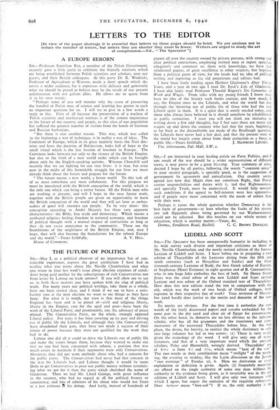THE FUTURE OF POLITICS
Snt,—May I, as a political observer of no importance but of con- siderable experience, express the great satisfaction I have had in reading what you wrote about Mr. Neville Chamberlain and what you wrote in your last week's issue about election expenses of candi- dates being paid neither by the subscriptions of rich Conservatives nor from levies by Labour on trade unions? If you will allow me to say so, in both these matters you have spoken with the ring of political truth. For many years our political writings, take them as a whole, have not been crystal clear, and I think if we are to have a satis- factory vote at the next election we want to see things as they have been. For what it is worth, my view is that most of the things England has been and is so proud of—civil and religious liberty, liberty in the Empire, care for the aged and poor—have been the work of the Liberal Party, and prominently, too, the advocacy of peace abroad. The Conservative Party, on the whole, strongly opposed Liberal policy. For years it has been covering up its past and driving out of public life the Liberals, and although they (the Conservatives) have abandoned their past, they have not made a success of their tenure of power because they were not qualified for the work they had to do.
Labour also did all it could to drive the Liberals out of public life and make the voters forget them, because they wanted to make out that no one had been concerned with reform, a position that was much easier to maintain if their opponents were only Conservatives. Moreover, they did not want anybody about who had a concern for the public purse. The Conservatives had never had that concern in the way the Liberals had, and Labour thought it would be more likely to get Conservatives to pour out public money without scrutinis- ing what we got for it than the party which cherished the name of Gladstone. Then we had Mr. Lloyd George, with great influence in the country, who had no regard at all for political history or consistency, and lots of admirers of his about who would not listen to a just estimate tlf his doings. And lastly, instead of hundreds of
papers all over the country owned by private persons, with strong and clear political convictions, employing trained men to report speeches adequately and comment on them with knowledge, we have had syndicated papers, of great excellence in other respects, but hopeless from a political point of view, for the heads had no idea of political writing and reporting as the old proprietors and editors had.
I have been lately reading again Herbert Gladstone's After Thnly Years, and a year or two ago I read Dr. Eyck's Life of Gladstone. I have also lately read Professor Thorold Rogers's Six Centuries of Work and Wages. From talks with my young friends I know they have no idea of the history such books contain, and how much, I say, the Empire owes to the Liberals, and what the world has lost through the throwing out of public life of those who had the real Liberal spirit in them. It is a spirit that is sorely needed today, and those who always have believed in it should somehow be rehabilitated in public estimation. I trust you will not think me intrusive in writing down a few odd thoughts, but I feel sure there are many old stagers up and down the country who feel that for years, beginning as far back as the discreditable use made of the Bradlaugh question, the Liberals have never had a fair deal, and that the present state of the world has largely come about from their extinction as a force in
public life.—Yours faithfully, J. MAWBURN LEVIEN. The Athenaeum, Pall Mall, S.W. z.






























 Previous page
Previous page